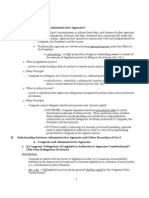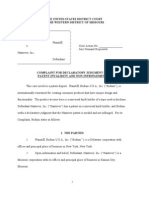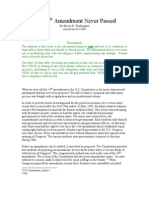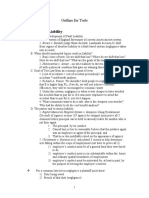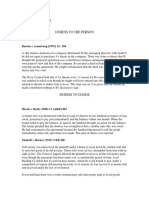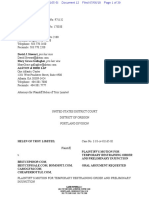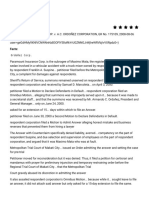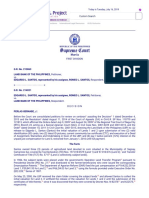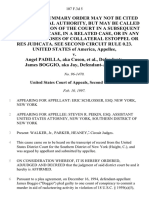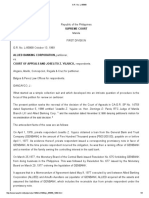Law FINAL
Law FINAL
Uploaded by
jdpangCopyright:
Available Formats
Law FINAL
Law FINAL
Uploaded by
jdpangCopyright
Available Formats
Share this document
Did you find this document useful?
Is this content inappropriate?
Copyright:
Available Formats
Law FINAL
Law FINAL
Uploaded by
jdpangCopyright:
Available Formats
CASES City of Everett, WA v. Mitchells Facts. Al and Rosemary Mitchell owned a small secondhand store.
On August 12, 1978, the Mitchells attended Alexander's Auction, where they frequently shopped to obtain merchandise for their business. While at the auction, they purchased a used safe for $50. They were told by the auctioneer that the inside compartment of the safe was locked and that no key could be found to unlock it. The safe was part of the Sumstad Estate. Several days after the auction, the Mitchells took the safe to a locksmith to have the locked compartment opened. When the locksmith opened the compartment he found $32,207 in cash. The locksmith called the City of Everett Police, who impounded the money. The City of Everett commenced an interpleader action against the Sumstad Estate and the Mitchells. The trial court entered summary judgment in favor of Sumstad Estate. The court of appeals affirmed. The Mitchells appealed. Was a contract formed between the seller and the buyer of the safe? The state supreme court held that under the objective theory of contracts, a contract was formed between the seller and the buyer of the safe. The court reversed the court of appeals grant of summary judgment to the Sumstad Estate and remanded the case to the trial court for entry of judgment in favor of the Mitchells. Bickham v. Washington Bank Facts: The individual and the bank struck an agreement for the individual to do his personal and corporate banking with the bank. Pursuant to the agreement, the bank agreed to lend money at an interest rate of 7-1/2 percent. In 1978, the individual was notified that his interest rates would be increased to 9-1/2 percent per annum. The individual protested this increase, and tried to obtain other satisfactory financing, to no avail. In 1984, the individual filed suit to recover all interest paid that exceeded 7-1/2 percent interest. The trial court stated Louisiana law did not permit a party to recover voluntary payments merely because the payments were made under protest. The trial court noted the individual could have sought judicial relief before paying the excess interest and because he failed to do so, he was precluded from recovering the excess interest. Issue: Was this a contract a bilateral or a unilateral contract? Rules: Bilateral contract entered into by way of exchange of promises of the parties, promise for a promise Analysis: The bank acted unilaterally Bickham didnt get money but had the interest rate returned to 7
percent. Has to be a contract before there is a breach of contract. There can only be monetary damages if there is a breach. Monetary damages are typically the losses that flow from the breach of contract. NO PUNITIVE DAMAGE FROM BREACH OF CONTRACTS. (was bilateral contarct and since he paid and even though he protested, couldnt refund him) Conclusion: The trial court judgment that held the individual could not recover the voluntary payments of higher interest even though he paid them under protest was affirmed. Wrench LLC v. Taco Bell Corporation Thomas Rinks and Joseph Shields created a cartoon character coined, Psycho Chihuaha under their co Wrench LLC. PC was a fiesty dog like character who had self confidence, and was an edgy dog that wouldnt back down. Taco Bell corporate marketing guys became interested in the character because they thought it would be a great mascot representation for their target audience (18 - 24 yr old males who smoke tree) After asking Rinks and Shields to provide marketing materials to show to others at corporate, the advertising agency suggested that it be a live Chihuahua dog that was instead manipulated by graphic imaging that be the personality of Taco Bell Food. When Taco Bell took the advice of their advertising specialists, they did not enter into an express contract with Wrench LLC, Rinks or Shields Taco Bell was sued by plaintiff Rinks and Shields for damages of implied-in-fact contract that was claimed to be breached-fact contract Ruling District Court sided with Rinks and Shields saying that sufficient evidence was present to show genuine issue of implied-in-fact contract. Conclusion US Court of Appeals held that the plaintiffs had stated a proper cause of action against defendent Taco Bell. Us Supreme Court denied review of the decision in this case. Rinks and Shields awarded total of $30 million for Taco Bell stealing their idea for a Psycho Chihuahua commericals. Later rewarded 11.8 million in prejudgement interest, bringing total to over $42 million Marvin v. Marvin Facts:
Couple was living together but not married...Lee Marvin compelled Michelle Marvin to leave his household after 6 years. He continued to support her her for another year and thereafter refused to provide further support. During the time they lived together, he earned over $1 million. Michelle Marvin brought an action against Lee Marvin for implied-in-fact contract existed between then that she was entitled for half of the property that they had acquired living together. She claimed that she gave up her career as an entertainer to be a full-time companion, homemaker and housekeeper, and cook. Conclusion: Ruled in Lees(husband) favor, even thought Family Law would be considered for non-marital relationships, since it was a sexual relationship, the community property is voidable. Michelle does not get any of the property. why does a sex relationship make it voidable? what rule/law applies? Family Law Act and Implied-In-Fact contract. Family Law Act has to do with Communal Property. Romasanta v. Mitton Facts: Landlord leased a motel he owned to his lessees for a 10-year period. The lessees had the option to extend the lease for another 10 years if they provided written notice 3 months before the lease ends. During the 10 years period, the lessees renovated and built up the motel to a AAA three star motel with financing for long-term investments that would last longer than the 10 year lease, which the landlord knew about. The lessees told their accountant to renew the lease before the deadline, but the accountant failed. Once the lessees knew, they sent a written notice to the landlord 13 days late and the landlord rejected. Conclusion: The court ruled in favor of Mitton under equitable relief, doctrine that judges make decisions based on fairness, and permitted the late renewal. Chenard v. Marcel Motors Facts: The Lewiston Lodge of Elks sponsored a golf tournament at the Fairlawn Country Club. Marce Motor made a promotion that agreed to give any golfer who scored a hole - in -one an automobile. Alphee Chenard, Jr. had seen the promotion and registered. On the thirteenth hole, he scored a hole in one, but Marcel Motors refused to give the automobile. Issue: Chenard sued for breach of contract? Rule: Unilateral contract contract in which the offerors offer can be accepted only by the performance of an act by the offeree; a promise for an act Analysis: Defendant argued the tournament was a form of gambling, making the contract illegal and unenforceable. Plaintiff's performance of the requested act was the agreed exchange for the
promised prize, resulting in an enforceable unilateral contract. Payment of the entrance fee did not turn the legal competition into an illegal wager where the fees did not make up the purse Conclusion The lower court's entry of judgment for plaintiff was affirmed because plaintiff's performance of the requested act was the agreed exchange for the promised prize, resulting in an enforceable unilateral contract that was not an illegal wager and did not violate state gambling laws. Winkel v. Family Health Center Facts Loren Vranich owned and practiced under Family Health Care Vranich hires Dennis Winkel under a written employment contracted that provided an annual salary, insurance benefits and other employment benefits Another doctor, Max Quan left the practice leaving Winkel with a much larger workload. For this reason Vranich entered an oral modification of their written contract where Winkel would receive a higher salary and a profit sharing bonus. Winkel recieved the increased salary but there was confusion to getting the bonus as Winkel thought he would not have to buy in but Vranich insists that the bonuses were contingent on doing so. Winkel sues Vranich and at trial court Winkel testified that his contractual damages amounted to $ 35,000. The jury found that Winkel was entitled to vacation pay of $ 3,000 and a profit-sharing bonus of $ 30,942.41. Vranich appeals for new trial Vranish argues the underlying issue for purposes of review is whether the original written employment contract was amended as a matter of law Rule- Under Montana Law, a written contract can be altered only in writing or by an executed oral agreement. Analysis- Since the modifications to the contract were not written down and accepted by both parties, the only way that Winkel is entitled to the bonuses, including profit sharing bonus, is to prove that the terms of the oral agreement were fully performed by each side. In Winkels own testimony, he admits that aside from the agreed upon raise to $3000/mth that was performed, all other terms of the modified contract were never been put into effect, never been completed and Winkel never got anything out of it. the oral agreement concerning profiit-sharing bonus was never performed, thus the oral agreement was not executed. Conclusion- Court found Winkel not entitled to any profit-sharing bonus when Vranish terminated Winkel's employment.
James v. Turilli Facts Rudy Turilli was the operator of the Jessie James Museum. states Jessie James was not killed and lived for many years after J. Frank Dalton
Went on nationwide television and stated that he would pay $10,000 to anyone who could prove him wrong. Stella James heard this offer and proved that Jesse James was killed by producing affidavits of persons related to Jesse James Turilli refused to pay Stella, Stella sued for breach of contract
Conclusion Stella James wins because she accepted the unilateral contract and performed it. There was sufficient evidence. Hunt v. Mcellory Bank Ben Hunt, the operator of S.B.H. Farms went to McIlroy Bank and Trust and requested a loan to build hog houses, buy livestock and farming operations. The bank agreed to loan $175,000 on promissory notes. At the time, oral discussions were held with the bank regarding long-term financing of SBHs operations - no dollar amount, interest rate or repayment terms were discussed. When the farms defaulted on promissory notes, the bank filed for foreclosure on the farm and other collateral. SBH counterclaimed for $750,000 damages alleging that the bank breached its oral contract to provide long-term financing. Conclusion: The court found that the debtors had failed to prove an oral agreement existed for the large loan, because there was never a meeting of the minds regarding the essential terms. Bank won Cerdes v. Wright Facts: The contractor and the owner agreed that the contractor would construct a residence for the owner. Nine months after construction began, the owner obtained an injunction ordering the contractor to stop work because of the contractor's delay in completing the job. The contractor sued for the remainder of the contract price. the trial court issued written reasons for judgment, finding that Cerdes substantially completed the home and awarding him the remainder of the contract price, $ 15,260.00. However, the trial court also ordered that materialmen's and laborers' liens amounting to.$ 10,625.49 be paid to wright from that amount. Further, the trial court found in favor of Wright on his reconventional demand against Cerdes [**3] and awarded him a total of $ 20,387.58, representing $ 10,000.00 for redhibitory defects in the home; $ 6,137.58 for the expenses of employing additional contractors to finish the project; $ 2,250.00 in liquidated damages for delay in completing the home within a reasonable time, and $ 2,000.00 in stipulated attorney's fees. Conclusion: The court amended the judgment by eliminating the order for a reduction in the contract price due to rehibitory defects (10,000) Wright won Lim v. The. TV Corporation International* Facts:
The island nation of Tuvalu was awarded the top-level domain name of .tv on the Internet. Tuvalu hired The.TV corporation International, a California corporation doing business under the name dotTV, to sell internet names bearing the .tv name. Lim bought the golf.tv name for $1,010 through an auction and recieved a confirmation email, but shortly after, the company retracted the confirmation claiming it was fake and stating the he had purchased the --golf.tv domain name. The golf domain name went back online for a minimum bid of $1 million. Lim argued that the -- did not exist on the Internet and therefor argued for a breach of contract. Trial court dismissed Lims case against dotTV because of the -- Conclusion: held that plaintiff had a cause of action against defendant for breach of contract and reinstated Lims case. Lim won
Jenkins v. Tuneup Jenkins leased a building to Tuneup Masters for 5 years. The lease provided that Tuneup Masters could extend the lease for an additional 5 years if it gave written notice of its intention to do so by certified or registered mail at least 6 months prior to the expiration of the lease. TuneupMasters VP prepared a letter exercising the option. The letter was lost in the mail The landlords refused to renew the lease and brought an unlawful detainer action aganist Tuneup Masters. Conclusion: Acceptance of a bilateral contract occurs at the time the offeree dispatches the acceptance by an authorized means of communication. Under this rule, the acceptance is effective when it is dispatched, even if it is lost in transmission. Accordingly, in the landlords unlawful detainer action, the trial court correctly rendered judgment in favor of the tenant, thereby extending the lease for the next five years. Lucy V. Zehmer Facts
Mr & Mrs Zehmer drinking w/ Lucy Mr. Zehmer offered to sell 471 acre farm to lucy for 50,000 Mr Zehmer said offer was a jest Lucy took it seriously and wanted to bind deal w/ a $5 deposit and signed contract Zehmers refused to perform contract and Lucy brought action to compel specific performance of the contract.
Objective theory of contracts - the theory that says the intent to contract is judged by the reasonable person standard and not by the subjective intent of the parties.
Conclusion
Lucy won because defendants' words and actions warranted a reasonable person's belief that a contract was intended. Plaintiffs reasonably believed the sale contract was a serious business transaction. The evidence suggested defendant husband was not too drunk to know what he was doing. Edmonds of Fresno v. MacDonad Group, Ltd. Facts:
MacDonald group managed Fresno Fashion Square Edmond signed a lease that provided there shall not be more the two jewelery stores Nine years later MacDonald wanted to expand mall and lease space to other jewelers The lease did not mention additional mall space, MacDonald sued and argued that the lease applied to mall additions
Analysis: Court found that the contract was applicable to the expansion of the shopping center as well as the original mall. Conclusion Edmond under the terms from the lease is given the right to not have similar businesses within 3 miles of Fresno Fashion Fair. Under these circumstances, it is reasonable to conclude that the covenant of good faith and fair dealing extends to the entire development appellants' reciprocal promise not to lease space within Fresno Fashion Fair to another directly competing business. MacDonald won Cooper v. Smith Facts Lester Cooper suffered serious injuries that caused him to be hospitalized. While hospitalized, Julie Smith, whom Cooper had met a year before, and Janet Smith, Julies mother, made numerous visits to him. Although Julie was married to another man, a romantic relationship was made between Cooper and Julie. While in the hospital, Cooper promised to marry Julie and she accepted. Julie obtained a divorce from her husband. Cooper ultimately received a $180,000 settlement for his injuries. After being released from the hospital, Cooper moved into Janets house and lived with Janet and Julie. Cooper purchased a computer, tanning bed, and horses. He also paid for various improvements to Janets house. Six months later Cooper and Julie moved out and Julie returned the engagement ring to Cooper. Cooper sued Julie and Janet to recover the gifts to them Coopers case was dismissed and he appealed.
Gift promise that is unenforcable because it lacks consideration. Also known as a gratuitous promise. The court of appeals held that Cooper cannot take the gifts to the Smiths because of a failed engagement but got ring back. -Fraiser v. Carter Facts John W. Frasier left a will that devised certain community and separate property to his wife Lena and their children. The devises left more to Lena than just her interest in the community property. However, the devises were conditioned upon her filing a waiver of interest that she failed to file and by not doing so only left her with her vested interest in the community property. Carter, Lenas brother was hired as her attorney to file the waiver but failed to do so. As a result, she received $19,358 less on the property. Because Carter screwed up, he promised in a letter to pay her back in payments with interest. When she tried to enforce the contract between them he alleged that the contract was not enforceable because it was not supported by valid consideration. Conclusion Lena wins because the contract was supported by valid consideration. Waiver of, or forbearance to exercise, a right that is not utterly groundless is sufficient consideration to support a contract made in reliance thereon. In this case, the court found that Carters promise to pay was supported by Lenas forbearance from prosecuting an action against him for his interest in her husbands estate. The Idaho Supreme Court affirmed the District Courts judgment awarding Lena $19,358.62 plus interest at a rate of 6 percent. Penley v. Penley Facts Clyde and Betty Penley were married. Clyde operated a tire business Betty owned an interest in a Kentucky FriedChicken (KFC) franchise. Betty became ill: she requested that Clyde begin spending additional time at the KFC franchise to ensure its continued operation. Betty agreed that if Clyde would devote full time to the KFC franchise,they would operate the business as a joint enterprise,share equally in the ownership of its assets, and divide its returns equally. Pursuant to this agreement,Clyde terminated his tire business and devoted his full time to the KFC franchise. Twelve years later, Betty left Clyde and denied him any rights in the KFC franchise. Clyde sued
Promisor: Betty: she promised her husband that if he would devote to the KFC franchise,they would operate the business as a joint enterprise,share equally in the ownership of its assets, and divide its returns equally. Promisee: Clyde: was subject to detriment: terminated his tire business and devoted his full time to the KFC franchise because of the promise made. Therefore the consideration has legal value : it is a contract monitary damages can be recovered: Clyde will get money for his participation in the business. Flood v. Fidelity Insurance Facts: Ellen and Richard Alvin Flood were married. Ellen took out a life insurance policy for her husband and named herself as the beneficiary. Ellen poisoned her husband and killed him with arsenic. Ellen tried to recover the life insurance on her husband. Fidelity refused and gave her the premiums back. Ellen sued. Conclusion: The court sided with Fidelity because the beneficiary of a life insurance policy is not entitled to the benefits if they kill the insured.
Ryno v. Tyra Facts: Ryno owned Bavarian Motors and Tyra entered into a bet with Ryno that a double-ornothing flip of a coin. Tyra won the toss and Ryno gave him the BMW car. A lawsuit unfolded. Conclusion: The court held that when Tyra won the toss and Ryno gave the car away, this was an illegal gambling contract. There was sufficient evidence to find that Ryno intended to transfer to Tyra his ownership interest in the BMW the time he delievered the documents, keys and possession of the automobile to Tyra. The court left the parties where they found them and Tyra got to keep the car.
Halbman v. Lemke Facts James Halbman, a minor, entered into a contract to purchase an Oldsmobile from Michael Lemke. Halbman paid $1000 in cash and agreed to make weekly payments until full purchase was paid for. 5 weeks later, a connecting rod on the vehicle broke, and Halbman took the car to a garage where it cost $637.40 to repair. Halbman refused to pay for repairs and disaffirmed the contract with Lemke and told him where it was located. Lemke refused to pick up the car and pay the repair bill. The car was towed to Halbmans house where he told Lemke to remove it. Lmeke refused. Car was vandalized, making it worthless. Halbman sued to disaffirm the contract and recover consideration from Lemke. Lemke argued that halbman must make full restitution. Infancy Doctrine - gives minors the right to disaffirm (or cancel) most contracts they have entered into with adults.
The court held that plaintiff had the absolute right to disaffirm the contract BUT as a condition of that right, he was required to restore as much of the consideration as, at the time of disaffirmance, remained in his possession. The court further held that once plaintiff had offered to return the inoperable car to defendant, he had met that requirement. Defendant was denied restitution for any use or depreciation of the car. Plaintiff did not misrepresent his age when he purchased the car. Halbman wins. Whitmire v. Watkins A.J. Whitmire and R. Lee Whitmire were brothers R. Lee Whitmire married Lillie Mae Whitmire A.J. did some services for four years around the land. 15 years later R.Lee tod A.J. that the land will be his once their gone. During this time A.J. did not provide any service for the past 16 years. Lillie Mae Whitmire was present. 30 years later, R.Lee and Lillie Mae passed away and A.J. filed a claim with the estate of Lillie Mae seeking the land. Watkins was the estate administrator.
Past Consideration - A prior act or performance. Past consideration will not support a new contract. New Consideration must be given.
The court held that the alleged agreement to convey land in exchange for past consideration was invalid. The court held that the promise failed as a gift as the buyer had not taken possession of the property and made valuable improvements in reliance on the donor's promise.
A.J. Whitmire failed to introduce any evidence that he had either taken possession of, or made valuable improvements upon, the land. Favor of Watkins Kemper Construction v. City of San Francisco San Francisco construction company is invited to make sealed bids on a new wing of the hospital. Then Mayor, Willie Brown, opens all the bids at a new conference. Plaintiffs bid (lowest of the others) is chosen for the project. Plaintiff, told to begin, but notices that the staff accountant failed to add in more than $1M in labor costs to the bid, brings this action for recision Did the defendant know ( or should have known) of plaintiffs unilateral mistake? Yes. Kemper could rescind.
Plaintiffs bid is two standard deviation below the mean bid of the others. This is extraordinary disparity should have put defendant (or any reasonable person) n notice a possible mistake. Kemper wins. From Scalise:
Kemper was is a case of unilateral mistake, where 15 contractors were secretly bidding to construct the new wing of SF General Hospital. As the Mayor (Willie Brown) opened and announced the bids one by one they were closely clumped together as expected--except for Kemper's bid which was several million dollars below the lowest entry. Brown eagerly accepted Kemper's bid and demanded they begin work immediately. Kemper claimed a mistake by the project manager resulted in the low bid, went to court claiming: unilateral mistake, where the other party knew (or should have known) of the mistake relives the mistaken party. Judgement for Kemper, contract rescinded
Ty Cobb baseball card case app law: unilateral mistake Facts: store owners mother in law was running store (knew nothing about baseball). child purchases a Ty Cobb baseball card for $15 from the mother in law. 2 zeros appeared in subscript. the dot after the 5 could have been a period or comma. store brings suit for rescission and restitution of contract of sale. Conclusion: Judge retained jurisdiction over the issue for 10 years not allowing the child to sell the card.
Beachcomber v. Boskett Fact Ron Boskett purchased a rare dime for nearly $450. He resold the rare coin for $500 to a retail coin dealer, Beachcomber Coins, Inc. The coin was examined prior to purchase. Beachcomber received an offer for $700 subject to certification of its genuiness by American Numismatic Society, however, this organization labeled the coin counterfeit. Beachcomber sued Boskett to rescind purchase of the coin. A mutual mistake of value exists if both parties know the object of the contract but are mistake as to its value. Because at the time of contract, neither party knew the coin was fraudulent, it is a mistake of value, Beachcomber cannot recover the money from Boskett.
Conclusion Beachcomber is stuck $500 dime that is only worth 10 cents. Bobby Floars Toyota, Inc. Vs. Smith App law: ratification facts: Smith (minor) purchased vehicle from Toyota dealership. Agreed to pay off in 30 months. After he turned 18 and made 10 monthly payments, he decided to disaffirm the contract claiming he entered into it as a minor. Toyota claimed smith ratified the contract since turning 18. When a reasonable time has elapsed after a minor reaches the age of majority, the contract is considered ratified. Conclusion: The court reversed the judgment which disaffirmed the automobile dealer's contract with the minor. Sherwood v. Walker Sherwood wanted to purchase a cow, walker refused when Sherwood attempted to buy at the agreed upon price. The cow actually was not barren, as both parties had assumed prior. Since there was a mutual mistake, a lack of meeting of minds. Both parties should have a clear understanding of whats being bargained for. Rescission was granted. Mutual mistake resulted in an redistribution of wealth, not enforceable by courts. Wells Fargo Credit Corporation v. Martin Wells Fargo obtained a judgement of foreclosure on a house owned by Mr. and Mrs. Clevenger. The Total indebtedness stated in the judgment was $207,141. Wells Fargo was represented by a paralegal, who had attended more than 1000 similar sales. Wells Fargos handwritten instruction sheet informed the paralegal to make one bid at $115,000 tbe tax-appraised value of the property. Martin, who was attending his first judicial sale, bid $20,000. The country clerk gave ample time for another bid and then announced, $20,000 going once, $20,000 going twice, sold to Harley... The paralegal screamed and said Stop! Im sorry. I made a mistake! The certificate of sale was made to Martin. Wells filed a suit to set aside judicial sale based on its unilateral mistake. Issue Does Wells Fargos unilateral mistake constitute grounds for setting aside the judicial sale? Rule Unilateral Mistake - a mistake in which only one part is mistaken about a material fact regarding the subject matter of a contract Analysis The amount of sale was grossly inadequate, it was an unilateral mistake by an agent of Wells Fargo.
Conclusion Held that Wells Fargos unilateral mistake did not entitle it to relief from the judicial sale Beavers v. Weatherly Facts Manzelle Johnson, who had been adjudicated insane, executed a quitclaim and warranty deed conveying real estate she owned to her guardian, Obbie Neal. Neal Subsequently conveyed the real estate to James R. Beaver by warranty deed. Charles D L. Weatherly (Johnsons present guardian) brought this action, seeking a decree of the court that title to the real estate be restored to Johnson because of her inability to contract. Issue Should Johnson be allowed to void the contract? Rule Adjudged Insane - Declared legally insane by proper court or administrative agency, Any contract made by such a person when his affairs are in the hands of a guardian is not merely voidable, but absolutely void. Analysis The court held that after a person had been adjudicated incompetent to the extent that she was incapable of managing her estate and the affairs of such person were vested in a guardian, the power of such person to contract was entirely gone. Any contract made by such a person when her affairs were in the hands of a guardian was not merely voidable, but absolutely void. Because the incompetence of the ward was a matter of public record, restitution by the ward was not required in order to cancel the conveyance, and any restitution to be sought was required to be sought from the first grantee. However, the court held that defendant grantee was entitled to recover the value of the labor and materials used to place improvements on the land, or the value the improvements added to the market value of the land, whichever was smaller. Conclusion Because Johnson was adjudged insane, the contract is void, but she was able to recover the value of labor used to place improvements on the land. Galloway v. Galloway Facts: Betty Galloway, an alcoholic signed a settlement agreement upon her divorce from her husband, Henry Galloway. Henry stated, in Bettys absence, that she had lucid intervals from her alcoholism. At the time she signed the agreement she had been sober for two months and was lucid when she signed the agreement. Betty moved to vacate the agreement after receiving legal counsel. Betty became incompetent and was assigned a guardian and conservator who was to settle the agreement.
Concl: The court affirmed the divorce between the husband and wife. The part of the trial court's judgment which related to the contractual matters of custody, property division, and alimony was vacated due to partial incapacity- A conveyance or other contract
of a person of unsound mind, but not entirely without understanding, made before the person's incapacity has been determined judicially upon application for the appointment of a guardian is subject to rescission as provided by the laws of this state. The case was remanded.
Hoffman v. Sun Valley Law: Statute of Fraud- Contracts involved with interest of real property must be in writing Facts: Frey and Hoffman wanted to buy a 1.64 acre property in Sun Valley, Idaho from the Sun Valley Realty Co. who owned it. They first approached Mr. Conger, a representative of the company who had a right to sell the property on behalf of the company (stipulating that the Executive Committee also approved a transaction). The two parties struck a deal for the property to be sold for $90K with a 9.25% interest rate and 30% down payment. The committee also approved the deal verbally and prepared the deed. However, before it could be finished being prepared, the company was sold and Frey and Hoffman were not able to purchase their Rudd Mountain lot as they previously thought. The two sued for breach of verbal contract. Conclusion: - No breach of contract since it was not in writing as deemed necessary by statute of fraud. Nothing was accepted on both sides so its just words. Briggss v. Sackett Facts: Briggs and wife owned home that they made down payment and had mortgage on. They were behind on mortgage and decided to enter into oral contract to sell house to Sacketts. Deal was Sacketts would pay arrearages and mortgage. After doing these things, 15 years later Brigs filed to void contract under violation of statute of Frauds where, typically the statute of frauds prevents oral conveyances of real estate. Must be written. Conclusion: Part performance - the court affirmed and held that although the statute of frauds prohibited oral contracts for the sale of real property, appellee equitable owners had partially performed the oral contract and recinding the contract would be inequitable and unjust, therefore, they were entitled to specific performance. Feiler v. Rosenbloom Law: Guaranty Contract Facts: Alfred Feiler was part of a 6-man board of directors of a company that sought to get a loan from a bank. The bank would only give the loan if each of the 6 directors would personally guarantee payment of the loan. Feiler did not want to be apart of the agreement due to prior financial reasons, but orally agreed to the other directors that he would personally pay them if the company defaulted. The company defaulted and the 5 directors had to pay the bank, but when they tried to collect from Feiler, he refused because the agreement was not in writing under the Statute of Frauds.
Conclusion: Due to the main purpose exception, Feiler would have to pay because the main purpose of the transaction and an oral collateral contract was to provide the financial benefit to the guarantor and does not have to be in writing. Ohanian v. Avis Rent a Car System Rule:One year rule - A rule which states that an executory contract that cannot be performed by its own terms within one year of its formation must be in writing Fact: Robert S. Ohinian was vice president of sales of West Region of Avis Rent a Car system, Inc. Ohanian proved a good performer through testimony - excellent during a economic downturn. Showed growing and profitable in the West Region. In Fall 1980 Aviss North East Region was doing badly and the President asked Ohanian to take over the region and he agreed as long as he was guaranteed not to be fired - Avis told him Unless you screw up badly there is no way you are going to get fired- you will never get hurt here in this company Approximately one year later, Avis fired Ohanian without cause and Avis asserted the Statue of Fraud against this claim. Conclusion: On review, the court affirmed, determining that the statute of frauds did not bar the oral employment contract, because since he was fired within the year the oral contract was valid. Ohanians claim of a limited right of dismissal in Avis and only for breach of contract by him ("totally screws up," "screwed up badly"), a heavy burden was placed on Avis at trial and Ohanian [**58] secured a substantial verdict. The jury properly arrived their finding of a promise for lifetime employment based upon the evidence, and that there was no basis for a new trial as to damages. Ohanian wins First Interstate Bank of Idaho N.A. v. West Law: guarantee contract Facts: David Brown met with Stan Steele a loan officer with the Bank of Idaho to discuss borrowing money from the bank to start a new business. After not qualifying, Brown told Steele that his former employers James and Donna West might guarantee the payment of the loan. Steele said that Mr. West orally told that he would guarantee the loan to Brown. Based on this, the bank loaned the money to Brown. Bank sent written agreement to Mr. and Mrs. West for signature, but never returned it. Brown defaulted on the loan, bank filed suit against West. Conclusion: According to the court, the evidence sufficiently supported the finding that there was no meeting of the minds for the guarantee contract because it needed to be in writing. No evidence that the guarantors' conduct constituted a false representation or a concealment of facts because they never signed the agreement but the bank gave out the loan anyway. Madison Square Garden, Inc. v. Muhammad Ali Law: Anticipatory Repudiation Facts: Ali entered with MSGB a contract that they would pay Ali $2.5 million to fight and Ali agreed. MSGB gave him $125,000 in advance pay, but before the fight, Ali backed out. MSGB is allowed to sue before the scheduled fight.
Conclusion: The court ruled in favor of Ali because although Ali did have a breach of contract, the manager offered to pay back the advance money to MSGB if the corporation did not respond and accepted the refund, thereby abandoning the contract. Hawaiian Telephone v. Microform Data Systems, Inc. Law: Damages Facts: Hawaiian Telephone company contracted with Microform corporation for a computerized directory system. After appellant failed to deliver the system by the specified date and the end of a penalty period, appellant cancelled the contract. In appellee's (Hawaiian) subsequent contract action, appellant (Microform) was found to have breached. Conclusion: The court affirmed the judgment that Microform corporation had breached its contract with appellee telephone company and an award of consequential damages, because appellee's written notice of cancellation was effected when appellant failed to cure the breach, the omission of a performance date after penalties accrued indicated that the parties intended performance and the exclusion of consequential damages was tied only to repair warranties. Welch v. Metro-Goldwyn-Mayer Film Co Law: Damages Facts: Welch was a movie-star known for being a sex symbol. She was cast by MGM to play a lead female role as a prostitute in Cannery Row. MGM would pay her $250,000 over a weekly payment cycle during filming. Th After 3 weeks, MGM fired and replaced her. Welch sued to recover for the rest of her payments and breach of contract. Conclusion: The jury found in favor of Welch on counts of breach of contract, conspiracy to induce breach of contract, slander, and breach of the implied covenant of good faith and fair dealing (bad faith). Welch recovered $2 million in compensatory damages and over $8 million in punitive damages from appellants Metro-Goldwyn-Mayer. covenant of good faith and fair dealing Gundersons, Inc. v. Ptarmigan Investment Company Law: Damages Facts: Ptarmigan paid Gundersons to build a golf course for them. Gundersons got of the way completed but had to halt due to adverse weather conditions. In the following spring, Ptarmigan ran out of funds to pay for the course and Gunderson sued to recover lost profits that it would have made on the remaining . Conclusion: The court reversed the judgment from the trial court, which had denied it lost profits in plaintiff's breach of contract action against defendant, where plaintiff was hired to construct a golf course, because plaintiff had met the burden of showing with reasonable certainty its lost profits, not as speculative, remote or imaginary. K.J. v. Greenhouse* Facts: USF School of Business graduate K.J. was on the horns of a dilemma. His lucrative concert business, that he had grown dramatically over the past three years had just taken a massive thump. Greenhouse, the venue for his next concert performance, had just called and reneged on their obligation. And with only 10 days before the event!
The File with Court of Equity for Specific Performance (if lose) File with Court of Law for Monetary Damages (list damages) Conclusion: Damages were recovered for revenue stream lost, Compensatory damages = $22K out of the asked $100k - cash spent on the concert Consequential $125k - cost of future earnings and hurt image. Cant sue for punitive damages Nominal Damages =
Scholastic v. Infinity Facts: Scholastic, the United States publisher of the Harry Potter series, sued an online bookseller and its distributor for flagrant violations of their strict contractual obligations not to ship copies of Harry Potter and the Deathly Hallows before 12:01 a.m. Saturday, the time and date set by the publisher. Issue: the loss of a bargain.potentially a nominal damage Conclusion: The publisher is seeking unspecified damages from Levy and Infinity. In a statement, Scholastic said the number of copies shipped is around one, one-hundredth of 1 percent of the 12 million copies printed by the publisher. Lisa Holton, president of Scholastics trade and book fairs division, said the company had a list of people who had ordered Deathly Hallows from DeepDiscount.com and was currently calling them to ask them to put aside the book until 12:01 a.m. Saturday.
PRESENTATIONS Dines v. Liberty Mutual Facts Roger J. Dines is the owner of a company engaged in the towing and storing of vehicles. On October 15, 1985, the State police recovered a stolen trailer. Its owner was unknown. The police ordered it towed to the Dines storage facility. On January 7, 1986, Liberty Mutual Insurance, the defendant and owner of the trailer, learned that it was in the plaintiff's possession but did nothing to regain it. On March 11, 1986, the plaintiff discovered that the defendant was the owner of the
property and gave written notice shortly thereafter with an itemized invoice for $2,980 in storage charges, based on twenty dollars a day from October 15, 1985, the date that he received the trailer from the police. Liberty Mutual refused to pay the charges, claiming that it owed only from January 7, 1986, the date that it learned the location of the trailer. On March 11, 1987, the defendant brought an action in the nature of replevin against the plaintiff, seeking recovery of the trailer. On March 18, 1987, the parties entered into an agreement releasing the trailer to the defendant, and the defendant agreed to drop its replevin action. The defendant also agreed that the plaintiff could bring an action in an attempt to recover storage charges. The defendant later sent the plaintiff a check for $1,260 as payment of storage charges from January 7, 1986, to March 10, 1986, at the rate of twenty dollars per day. The plaintiff then brought the present action in which he asked for $10,400. That sum represented storage charges from the date he received the trailer from the state police to the date that he returned it to the defendant.
Terms Replevin "claim and delivery," is a legal remedy for a person to recover goods unlawfully withheld from his or her possession. Issue Did the defendant and the plaintiff enter into a contract? If so, when did it come into effect? Rule A quasi-contract or implied in law contracts are implied from the conduct of the parties. The following elements must be established: 1. The plaintiff provided property or services to the defendant. 2. The plaintiff expected to be paid by the defendant for the property or service and did not provide the property or service gratuitously. 3. The defendant was given an opportunity to reject the property or services provided by the plaintiff but failed to do so. Holding The trial judge found that the plaintiff's storage rates were reasonable and that he had complied in all respects with the notice requirements. The judge ruled that the plaintiff was entitled to twenty dollars per day for the period which he claimed, October 15, 1985, the date that the plaintiff received the trailer until March 18, 1987. He held that a "quasi-contract or a contract implied in law existed between the parties. The judge then limited the plaintiff's recovery to the fair and reasonable value of the trailer, which he set at $5,000. Judgment was issued in favor of the plaintiff for $3,740 ($5,000 minus $1,260 already paid to the plaintiff).
J.C. Durick Ins. v. Andrus Facts
Peter Andrus owned an apartment building that he had insured under a fire insurance policy sold by J.C. Durick Insurance (Durick). Two months before expiration, Durick notified Andrus that the building should be insured for $48,000 (or 80% of the buildings value) as required by the company. Andrus replied that he wanted insurance to match the amount of the outstanding mortgage on the building ($24,000) and if Durick could not sell this insurance, he will go somewhere else. Durick sent a new insurance policy in the face amount of $48,000, with the notation that the policy was automatically accepted unless Andrus notified them not to. Andrus did not reply and did not pay the premiums on the policy. Durick sued Andrus to recover these premiums? Issue Is Andrus liable to pay for the premiums? Rule Acceptance - a manifestation of assent by the offeree to the terms of the offer in manner invited or required by the offer as measured by the objective theory of contracts Unequivocal Acceptance: mirror image rule, states that the offeree must accept the offerrors terms stated in the offer Silence as Acceptance 1. The offeree has indicated that silence means assent 2. The offeree has signed an agreement indicating continuing acceptance of delivery until further notification 3. Prior dealings between parties indicate that silence means acceptance 4. The offeree takes the benefit of goods or services provided by the offeror. Even though the offeree (a) has an opportunity to reject the goods or services but fails to do so and (b) knows the offeror expects to be compensated.
Conclusion The court reversed the judgment that was iin favor of plaintiff insurer because as a matter of law no contract was created since there was never a meeting of the minds or acceptance by defendant insured with respect to the insurance contract terms. The court also found that an implied contract was not created since a valuable service was not rendered.
Dementas v. Estate of Tallas Facts: Jack Tallas, an immigrant from Greece came to the United States in 1914. He lived in Salt Lake City for nearly seventy years where had monetary success as an insurance agent and landlord. Jack Tallas began to suffer from old age and needed help doing day to day activities.
Peter Dementas, a close friend of Tallas, had helped him over the years by picking up his mail, driving him to the grocery store, and assisting with the management of Tallas's rental properties. On December 18, 1982, Tallas met with Dementas and dictated a memorandum to him, in Greek, stating that he owed Dementas $ 50,000 for his help over the years Jack Tallas had kept the Greek document, retyped it in English, notarized the English version with his own notary seal, and, three days later, delivered the documents to Dementas. Tallas died on February 4, 1983, without changing his will to include Dementas as an "heir." Dementas filed a timely claim for $ 50,000 with Tallas's estate, pursuant to Utah Code Ann. 75-3-803 (1978). A copy of the memorandum given to him by Tallas was attached to the claim. The estate denied the claim and Dementas brought this action to recover the discussed $50,000.
Issue: Was there adequate consideration to obtain money from the estate? Rule: Consideration - to have consideration a contracts must have two things: - legal value - the promisee suffers a legal detriment or the promisor receives a legal benefit - bargained- for exchange - exchange that parties engage in that leads to an enforceable contract Account Stated - a statement between the creditor and debtor based on prior transactions that says a certain amount is owed on a certain date. Analysis: The memorandum appears to do three things: 1. Acknowledges that Dementas is already mentioned in the will in consideration of the various services rendered by him 2. Recites that Tallas owes Dementas $ 50,000 in consideration of the services rendered. 3. Expresses an intention on the part of Tallas to change his will and make Dementas an "heir." Following trial, in which the court heard extensive testimony from witnesses and received numerous exhibits, the court concluded that the memorandum was executed by Tallas free from fraud, duress, or undue influence. However, the court did not find the memorandum to constitute an enforceable contract. Rather, the court found that the memorandum was an expression of Tallas's appreciation for services gratuitously performed by Dementas. The court concluded that the memorandum, both in its Greek and English versions, showed that Tallas intended--at some time in the future to include Dementas in his will or to otherwise compensate him, but that Tallas
failed to complete the transaction prior to his death. The court also ruled that Dementas's "account stated" theory was barred since no such claim was articulated in the notice of claim filed with the estate. Alternatively, the court concluded no "account stated" had been proven. Conclusion Estate of Tallas won. Dementas did not show that the contract had consideration in the sense that there was no bargained for exchange and the legal value was negligible. Also, Dementas tried the account stated argument to claim it was a payment being withheld, but that did not hold up because there were no prior transactions. Hampton v. Federal Express Corporation Facts Carl Hampton, a 13 year old cancer patient in Nebraska, was waiting for a positive bone marrow in order to undergo transplant surgery to save his life. A matching marrow sample from a potential donor (one of five discovered) was sent to Federal Express by Childrens Memorial Hospital. The hospital had entered a contract with a common carrier, FedEx. The contract signed for FedEx states that they are not liable for more than $100 or less for damage or loss and charges 30 cents for each additional $100 of declared value up to the maximum shown in their guide. FedEx failed to deliever the package of blood, Carl died of cancer without transplant. Carls dad sued FedEx for personal injury, wrongful death and loss of services. Issue Is FedEx contractual clause, which limits liability to $100, valid under Federal Law? Rule Contractual Limitation of Liability: the ability to limit the financial and legal liability to the duty of care in a contract under certain specified terms Common carrier: a company that offers transportation services to general public. They owe a duty to strict liability excepted only for acts of God, public enemy, order of government, act of shipper, or inherent nature of foods. The may legally limit the dollar amount of the liability in a contract by offering the bailor the option to declare a higher value for the bail goods at an additional charge. Analysis FedEx was legally able to limit the liability of care. FedEx has no knowledge of what is is shipping, and the hospital did not declare its higher value therefore could no foresee that at childs life would be threatened if the package was not delivered. Conclusion FedEx wins. They owe Hampton $100 dollars.
HANDOUTS AND PRINTOUTS Offer and Acceptance*- Offer must have: 1 contractual intent, 2 terms of offer must be definitive 3. communication to offeree. methods to terminate offer: counteroffer, rejection, revocation, lapse of time, death/disability of both parties. acceptance-voluntary act by offeree exerscizing the power to accept the offer bestowed by offeror. 1 can only be accepted by offeree 2 acceptance must be unconditional 3 acceptance must be timely and legally valid. Kolodziej-dustin k. sued teacher for breach of unilateral contract. teacher offered 1 mill to land in busy atlanta airport and travel 5 miles in under 28 minutes, attempting to prove it couldnt be done by a murderer. difficult to prove that a reasonable person would not have understood it as a joke. Consideration*- a legal benefit for which parties to a contract bargain. K is an exchange of consideration. can be a promise to do something, or pay something. A unilateral contract is when an offeror makes a promise and an offeree accepts the contract by performing it. Kolodzeieg was most likely unable to prove that the offer was a reasonable objective person would have taken seriously Infidelity Contract-an agreement that your partner would not indulge in infidelity and if he/she does, then you can take him/her to the court Sidewalk Contract*-silence cannot be considered acceptance except under specific circumstances. Leave your name on your front door, garage door or where it is easily visible from the street before 8am if you do not wish for your home to be included. Service fee is $15.00 Silence as Acceptance 1. The offeree has indicated that silence means assent 2. The offeree has signed an agreement indicating continuing acceptance of delivery until further notification 3. Prior dealings between parties indicate that silence means acceptance 4. The offeree takes the benefit of goods or services provided by the offeror. Even though the offeree (a) has an opportunity to reject the goods or services but fails to do so and (b) knows the offeror expects to be compensated. Rare Rock-Matt White purchased 23 acres from his aunt josephine for $50,000 so she could afford to live in a retirement home. He discovered Goshen stone valued at $100/ton. approx 24 million tons estimated on his land. And he started a business to mine the stone. Mutuality of Assent*-Both parties must be clear in understanding of exactly what is being bargained for, otherwise a unilateral or mutual mistake occurs. in a mutual mistake, mostly the court stays out, but if it is a unilateral mistake and there is an asymmetrical distribution of wealth, the court is more likely to take part. Statute of Frauds*-statue requiring certain contracts to be in writing (involving interest in real property, cannot be performed in 1 year, sale of goods more than $500, lease of goods exceeding $1000 in payments). requires certain contracts to be in writing and signed by the party against whom enforcement is sought. intended so that the terms of important Ks are not forgotten, misunderstood or fabricated. Practice Final Exam Contracts Crossword
TERMS bilateral contract-promise for promise, entered into by exchange of promise between parties unilateral contract-promise for actcontract which offerers offer can be accepted by performance of act by offeree unilaterial contract - contract in which the offerors offer can be accepted only by the performance of an act by the offeree; a promise for an act implied-in-law (quasi) contract-equitable doctrine where monetary dmgs awarded to plaintiff for providing work or services to a defendant even though no contract existed implied-in-fact contract-K in which agreement between parties has been inferred from their conduct objective theory of contracts- the intent to K is judged by the reasonable person standard and not by the subjective intent of the parties executory-contract not fully completed by either or both sides partially executed-executory K executed contracts-contract that has been fully performed on both sides; completed contract essential terms of a contract-o+a+c=k-essential terms of a contract (offer, acceptance, consideration=something of legal value given in exchange for a promise) gift-lack consideration, are not enforceable in court. gratuitous promises, must offer something in exchange contractual intent*-can be proven and enforceable definite terms-a term in K that is specifically stated implied terms-a term in a K that can be reasonably supplied by the courts advertisements as offers-an invitation to make an offer, or an actual offer rewards as offers-given for performance of a service or attainment, 1.offeree must have knowledge of the reward prior to performance 2. perform the requested act auctions* (with reserve and without reserve)-in which the seller retains the right to refuse the highest bidder and draw the goods from sale (default type). the seller expressly gives up his or her right to withdraw from sale for highest bidder lapse of time-stated period of time after which an offer terminates, if not stated than reasonable time is default revocation of offer-withdrawal of an offer by offeror terminating the offer acceptance of offer*-manifestation of assent by the offeree to the terms of the offer in a manner invited or required by the offer. unilateral accepted by performance, bilateral by promise or performance in were permitted. mailbox rules-acceptance upon dispatch rule, offer is effective when it is dispatched, even if letter is lost in mail counteroffer-response by offeree containing terms/conditions different from or in addition to those of the offer silence as acceptance-not acceptance unless1) offeree indicates it is 2) offeree signd an agreement indicating further acceptance of delivery until notification 3) prior dealings between parties indicates it is 4) offeree takes the goods/services though the offeree a. has an opportunity to reject and fails and b. knows the offeror expects to be compensated
timely acceptancerejection of offer-express words or conduct by the offeree that rejects an offer promissory estoppel-equitable doctrine that prevents the withdrawal of a promise by promisor if it will adversely affect a promisee who has adjusted their position in a justifiable reliance on the promise consideration and adequacy of consideration-something of legal value given for a promise(1something of legal value detriment/benefit 2bargained-for exchange) forbearance to sue on a claim-voluntarily forfeiting the right to sue in favor of another method legal benefit and legal detriment-first req of consideration, detriment to promisee or benefit for promisor illegal consideration-a promise to refrain from doing an illegal act, constitutes K lacking consideration usury-law that sets an upper lmit on int. rates that can be charged on certain types of loans illusory promise-a K lacking consideration: which one of both can choose not to perform their obligations illegal contract-contract that has an illegal object. Such contracts are void. moral obligation-lacking consideration: a promise rising out of a person making a promise for honor. sense of moral obligation pre-existing duty-lacking consideration: promise made on something a person is already under an obligation to do void contracts- A contract that was never actually created. Can be based on illegal terms or the inelgibilty of a party (lacking mental capacity). There is no obligation to fulfill these contracts. unilateral mistake-only 1 party is mistaken about a material fact regarding subject matter of K mutual mistake-fact:both parties mistake about material fact that is important to K, value:both parties know the object, but are mistaken about the value misrepresentation-fraud. an assertion is made that is not in accord with the facts fraud-intentional/fraudulent misrepresentation, when one person decides to induce another to rely and act on a mispresentation grounds for rescission duress-where 1 party threatens to do a wrongful act unless other party enters into K undue influence-one person takes advantage of anothers mental,emotional or physical weakness and unduly persuades that person to enter into K, persuasion of wrongdoer must overcome free will of innocent party covenants not to compete-K that says a seller of a business or an employee will not engage in a similar business or ccupation within a specific geographic ares for a specified time following sale of business or termination of employment (noncompete clause) non-disclosure agreement (NDA) signature on contracts written contracts mortgage-interest in real property given to a lender as security for the repayment of a loan lease-transfer of the right to use real property for a specified period of time guaranty contract-promise where 1 person agrees to answer for the devts.duties of another. K between guarantor and original creditor one year rule- states an executory K that cannot be performed its own terms in 1 year but be in writing sale of goods over $500-requires K
parol evidence rule-if a written K is a complete and final statement of the parties agreement, any prior written or oral statements that alter, contradict or in addition to the terms are inadmissible in court regarding the K. several exceptions exist. partial performance-an equitable doctrine that allows court to order an oral Kfor sale of alnd or transfer of another interest in real property to be specifically performed if it has been partially performed and performance is necessary to avoid injustice measure of damagesrescission of contract (rescind)*-an act to undo a K. available of ther has been a material breach of K, fraud, duress, undue influence or a mistake. Minor and major breach-when a party renders substantial performance of duties, nonsubstiantial commercial impracticability-nonperformance excused if extreme or unexpected development or expense makes it impractical for performance frustration of purpose-Frustration of purpose occurs when an unforeseen event undermines a party's principal purpose for entering into a contract, and both parties knew of this principal purpose at the time the contract was made. The principal party may be exempt from fulfilling all terms of the original contract. impossibility of performance-nonperformance excused if K becomes impossible to perform objectively compensatory damages-award of money to compensate a non-breaching party for loss of the bargain. places them in the same position as if K had been fully performed, restoring benefit of bargain consequential damages-foreseeable dmgs from circumstances outside K, breaching party must know that it will cause dmg to other party to be liable liquidated damages-dmgs that parties to a K agree in advance should be paid if K is breached nominal damages-dmgs awarded when the nonbreaching party sues the breaching party even though no financial loss has resulted from breach. usually a very small amount mitigation of damages-nonbreaching partys legal duty to avoid or reduce dmgs caused by breach of K specific performance-remedy that order breaching party to perform acts in the K. usually awarded in unique subject matter cases reformation-equitable doctrine that permits court to rewrite a K to express parties true intentions rescission*-the unmaking of a contract between parties. This is done to bring the parties, as far as possible, back to the position in which they were before they entered into a contract (the status quo ante). is available if there has been a material breach of contract, fraud, duress, undue influence or mistake. restitution*-return of goods or property received from the other party to rescind a K. if actual are not available then cash equivalent intentional interference with contractual relations-tort, when a 3rd party induces a contracting party to breach the K with another STATUTES
UCITA-uniform Computer Information Transactions Act (UCITA) is a proposed law to create a clear and uniform set of rules to govern such areas as software licensing, online access, and other transactions in computer information. It is intended to bring the same uniformity and certainty to the rules that apply to information technology transactions that the Uniform Commercial Code does for the sale of goods. Uniform Commercial Code - UCC drafted in 1952. creates a uniform system of commercial law among 50 states. provisions take precedence over common law of contracts. 2 major provisions (out of 9): article 2: sales, prescribes a set of uniform rules of creation and enforcement of K for sale of goods. referred to as sales contracts Statute of Frauds - requires certain contracts to be in writing and signed by the party against whom enforcement is sought. intended so that the terms of important Ks are not forgotten, misunderstood or fabricated. FILMS Lucy Romero v. Uptown Hi Fi Store*- Lucy Romero purchased an over-priced stereo system from Uptown Hi Fi with the original intent of buying a discounted item. Issues: Bait-and-switch of the salesman. Price gauging, consumer protection, seller fraud (unconscionability), caveat emptor (let the buyer beware) - the old method of doing business, courts no longer support this. Pennzoil v. Texaco* Pennzoil and Getty Oil Company were negotiating a merger ($110 + $5 stub per share) when Texaco offered a better price and Getty sold. Pennzoil sued for Tortious interference with contract, though no final K had been signed. Jury awarded 10.5 billion in compensatory and punitive dmgs. Press articles were released by both parties, hand-shakes were exchanged. issue of honor and intent in actions that typical seal a deal. contractual intent existed based on the amount of money invested on both ends through lawyers and drafting etc.
Contractual Remedies - Johnsons pool case. Pool was 2 ft too small, 80 sq. ft. lost. Breach of contract for contractor 3 choices: 1 ignore 2 contractual remedy. types of remedies: 1. waver of breach 2. legal remedy (liquidated, consequential, compensatory, punitive, nominal) 3. equitable remedies, money isnt enough (reformation, quasi-contract, injunctions/writs, specific performance, rescission/restitution). SHORT ANSWER Types of Contracts - 2 or more people/organizations/entities entering into an agreement binding by law. unilateral and bilateral, 3 types: expres K includes verbal and written, implied- in fact are bus passes, conduct and purchasing. implied-in-law or quasi contracts.
Sherwood v. Walker*-Sherwood wanted to purchase a cow, walker refused when Sherwood attempted to buy at the agreed upon price. The cow actually was not barren, as both parties had assumed prior. Since there was a mutual mistake, a lack of meeting of minds. Both parties should have a clear understanding of whats being bargained for. Rescission was granted. Mutual mistake resulted in an redistribution of wealth, not enforceable by courts. Pennzoil v. Texaco*- Pennzoil and Getty Oil Company were negotiating a merger ($110 + $5 stub per share) when Texaco offered a better price and Getty sold. Pennzoil sued for Tortious interference with contract, though no final K had been signed. Jury awarded 10.5 billion in compensatory and punitive dmgs. Press articles were released by both parties, hand-shakes were exchanged. issue of honor and intent in actions that typical seal a deal. contractual intent existed based on the amount of money invested on both ends through lawyers and drafting etc. K.J. v. Greenhouse* Facts: USF School of Business graduate K.J. was on the horns of a dilemma. His lucrative concert business, that he had grown dramatically over the past three years had just taken a massive thump. Greenhouse, the venue for his next concert performance, had just called and reneged on their obligation. And with only 10 days before the event! The File with Court of Equity for Specific Performance (if lose) File with Court of Law for Monetary Damages (list damages) Conclusion: Parol Evidence Rule - Originally developed by courts as part of the common law of Ks. the UCC has adopted this for sales and lease contracts. if a written K is a complete and final statement of the parties agreement, any contemporaneous written or oral statements that alter, contradict or in addition to the terms are inadmissible in court regarding the K. several exceptions exist. a whole and complete contract is the best evidence of the terms of a parties agreement, and any verbal statements are otherwise inadmissible.
You might also like
- Prosecution Memorial Format 2Document89 pagesProsecution Memorial Format 2Neha KoriNo ratings yet
- Rhino Shield Scam!Document17 pagesRhino Shield Scam!KarlSmith949No ratings yet
- Administrative Law Outline 12-17-10Document33 pagesAdministrative Law Outline 12-17-10Andrea ChairesNo ratings yet
- Department of Justice Lawsuit Against Alabama Department of CorrectionsDocument24 pagesDepartment of Justice Lawsuit Against Alabama Department of CorrectionsMike Cason100% (2)
- LGST 101 ProblemsDocument16 pagesLGST 101 ProblemsKrishnan SethumadhavanNo ratings yet
- Chong v. CADocument2 pagesChong v. CAJonathan Santos100% (1)
- The King Takes Your Castle: City Laws That Restrict Your Property RightsFrom EverandThe King Takes Your Castle: City Laws That Restrict Your Property RightsNo ratings yet
- Ballb 1205 II Sem Law of Torts and Consumer Protection BL 2005 Lecture On TrespassDocument13 pagesBallb 1205 II Sem Law of Torts and Consumer Protection BL 2005 Lecture On TrespassSiddhiNo ratings yet
- Trial Skills - Notes From Courting JusticeDocument4 pagesTrial Skills - Notes From Courting JusticeAlgamar_LatiphNo ratings yet
- Missouri v. Ross, 299 U.S. 72 (1936)Document4 pagesMissouri v. Ross, 299 U.S. 72 (1936)Scribd Government DocsNo ratings yet
- A.hrc.29.32 AevDocument18 pagesA.hrc.29.32 AevJason Koebler100% (2)
- Bodum v. HantoverDocument6 pagesBodum v. HantoverPriorSmartNo ratings yet
- Holton v. Reed, 193 F.2d 390, 10th Cir. (1951)Document7 pagesHolton v. Reed, 193 F.2d 390, 10th Cir. (1951)Scribd Government DocsNo ratings yet
- R v. Dica (2004) Q.B. 1257Document17 pagesR v. Dica (2004) Q.B. 1257Jonathan CelestinNo ratings yet
- The 14 Amendment Never Passed: DisclaimerDocument5 pagesThe 14 Amendment Never Passed: DisclaimerDavid-CrockettNo ratings yet
- The Vestigial Constitution: The History and Significance of The Right To Petition.Document81 pagesThe Vestigial Constitution: The History and Significance of The Right To Petition.Jason HenryNo ratings yet
- I. Intro To Tort Liability: Outline For TortsDocument17 pagesI. Intro To Tort Liability: Outline For Tortsgrad09No ratings yet
- Property Outline: First Acquisition of Property 1. CaptureDocument7 pagesProperty Outline: First Acquisition of Property 1. CaptureJeremiahgibsonNo ratings yet
- NC Gun Laws Need A Change: Legislature Went Too Far in Restricting Gun Possession by Ex-FelonsDocument6 pagesNC Gun Laws Need A Change: Legislature Went Too Far in Restricting Gun Possession by Ex-FelonsJohn Locke Foundation100% (1)
- Commerce and Character, LernerDocument25 pagesCommerce and Character, Lernersyminkov8016No ratings yet
- FO B1 Commission Meeting 4-10-03 FDR - Tab 7 - Caspesen Resume - Samuel M W Caspersen 544Document1 pageFO B1 Commission Meeting 4-10-03 FDR - Tab 7 - Caspesen Resume - Samuel M W Caspersen 5449/11 Document ArchiveNo ratings yet
- Death of Contract TheoryDocument10 pagesDeath of Contract Theoryramiolwan100% (1)
- 3 Day Request For DiscoveryDocument6 pages3 Day Request For DiscoveryFinally Home RescueNo ratings yet
- Certified Judicial Trash - Defendant Corrupt Judge Charlene E. HoneywellDocument73 pagesCertified Judicial Trash - Defendant Corrupt Judge Charlene E. HoneywellWSJ_CorruptionNo ratings yet
- Regulatory Breakdown: The Crisis of Confidence in U.S. RegulationFrom EverandRegulatory Breakdown: The Crisis of Confidence in U.S. RegulationNo ratings yet
- AgreementDocument9 pagesAgreementbuttercupedNo ratings yet
- Hollis V Dow Corning CorporationDocument2 pagesHollis V Dow Corning CorporationAlice Jiang100% (1)
- Law of Torts WipDocument11 pagesLaw of Torts WipSHUBHAM SHARMANo ratings yet
- Tort Outline .. Internet SourceDocument43 pagesTort Outline .. Internet SourceColeman HengesbachNo ratings yet
- Juris Assignment 1Document4 pagesJuris Assignment 1mandlenkosiNo ratings yet
- United States Court of Appeals, Third Circuit.: Nos. 76-2315 and 76-2316Document13 pagesUnited States Court of Appeals, Third Circuit.: Nos. 76-2315 and 76-2316Scribd Government DocsNo ratings yet
- Arrest and Attachment Before JudgmentDocument7 pagesArrest and Attachment Before Judgmentnagesh komatiNo ratings yet
- Us District Court Oregon Habeas Corpus Exhaustion of State Appelate Court Remedies 0Document37 pagesUs District Court Oregon Habeas Corpus Exhaustion of State Appelate Court Remedies 0jacque zidane100% (1)
- Homicide Violent Crimes.: Personal Crimes, Property Crimes, Inchoate Crimes, Statutory Crimes, and Financial CrimesDocument46 pagesHomicide Violent Crimes.: Personal Crimes, Property Crimes, Inchoate Crimes, Statutory Crimes, and Financial CrimesJake Artz SulapasNo ratings yet
- Excusable Defence-Justifiable DefenceDocument38 pagesExcusable Defence-Justifiable Defencezoha aslamNo ratings yet
- # 13 Criminal Damage PDFDocument8 pages# 13 Criminal Damage PDFDinesh Kannen KandiahNo ratings yet
- Citizenship and Jurisdiction of The Federal Government-DocsDocument78 pagesCitizenship and Jurisdiction of The Federal Government-DocsJeff MaehrNo ratings yet
- Code Search Assignment 1Document6 pagesCode Search Assignment 1Jackie BeadmanNo ratings yet
- St. Louis City Lawsuit Against Missouri, SB26Document16 pagesSt. Louis City Lawsuit Against Missouri, SB26Danny WicentowskiNo ratings yet
- Cases On DuressDocument6 pagesCases On Duressnanaamo100% (2)
- The Origins of The American Military Coup of 2012Document25 pagesThe Origins of The American Military Coup of 2012Intellihub_ResearchNo ratings yet
- CivPro Personal Jurisdiction Flow ChartDocument3 pagesCivPro Personal Jurisdiction Flow ChartWilliam StroudNo ratings yet
- Henry Winston v. United States, 305 F.2d 253, 2d Cir. (1962)Document47 pagesHenry Winston v. United States, 305 F.2d 253, 2d Cir. (1962)Scribd Government Docs100% (1)
- #263 Strength & PowerDocument2 pages#263 Strength & PowerSaxon IngaNo ratings yet
- RECUSED US District Court Judge - Allison Dale Burroughs, Formally Accused of Judicial Treason, was Initially recommended by US Senator (and 2020 Pres. Candidate) Elizabeth Warren (D-MA) & US Senator Ed Markey (D-MA)Document5 pagesRECUSED US District Court Judge - Allison Dale Burroughs, Formally Accused of Judicial Treason, was Initially recommended by US Senator (and 2020 Pres. Candidate) Elizabeth Warren (D-MA) & US Senator Ed Markey (D-MA)Mohan HariharNo ratings yet
- CausationDocument3 pagesCausationLebogang MzwimbiNo ratings yet
- Fall 2010 OutlineDocument7 pagesFall 2010 OutlinePatrick HarringtonNo ratings yet
- Motion For TRO and PIDocument39 pagesMotion For TRO and PIKenan FarrellNo ratings yet
- Doctrine of MistakeDocument10 pagesDoctrine of MistakeAnushi AminNo ratings yet
- Single Mothers Sue Missouri For Refusing To Expand MedicaidDocument18 pagesSingle Mothers Sue Missouri For Refusing To Expand MedicaidKevinSeanHeldNo ratings yet
- Miller v. Vilsack Motion For A Preliminary InjunctionDocument7 pagesMiller v. Vilsack Motion For A Preliminary InjunctionWashington Free BeaconNo ratings yet
- Property Tutorial 2 Land Law and EquityDocument8 pagesProperty Tutorial 2 Land Law and EquityYeji LeeNo ratings yet
- Consent Searches: "Sure You Can Look. I Don't Have Any Drugs."Document25 pagesConsent Searches: "Sure You Can Look. I Don't Have Any Drugs."Darren ChakerNo ratings yet
- The Nations Credit by CGMDocument22 pagesThe Nations Credit by CGMalexjamesinfoNo ratings yet
- Question 1: Was There An Agreement For Promise?Document19 pagesQuestion 1: Was There An Agreement For Promise?alivanhornNo ratings yet
- 100 Ways International LawDocument41 pages100 Ways International LawSamantha BlancoNo ratings yet
- DeSantis Mask Appeal Request For Supreme Court JurisdictionDocument11 pagesDeSantis Mask Appeal Request For Supreme Court JurisdictionCharles R. Gallagher IIINo ratings yet
- Case DigestDocument3 pagesCase DigestLenie Ricardo Dela CruzNo ratings yet
- A Tea Party PrimerDocument8 pagesA Tea Party PrimerGreg MildNo ratings yet
- The Limits of Sovereignty: Property Confiscation in the Union and the Confederacy during the Civil WarFrom EverandThe Limits of Sovereignty: Property Confiscation in the Union and the Confederacy during the Civil WarNo ratings yet
- Swindled: If Government is ‘for the people’, Why is the King Wearing No Clothes?From EverandSwindled: If Government is ‘for the people’, Why is the King Wearing No Clothes?Rating: 5 out of 5 stars5/5 (2)
- JAT Wheels v. DB Motoring - Request For Default JudgmentDocument36 pagesJAT Wheels v. DB Motoring - Request For Default JudgmentSarah BursteinNo ratings yet
- MA-AO Sugar v. CADocument2 pagesMA-AO Sugar v. CAKaren Joy MasapolNo ratings yet
- United States v. Kenneth S. Hastings, 847 F.2d 920, 1st Cir. (1988)Document18 pagesUnited States v. Kenneth S. Hastings, 847 F.2d 920, 1st Cir. (1988)Scribd Government DocsNo ratings yet
- Edward Vieth Sittler v. United States, 316 F.2d 312, 2d Cir. (1963)Document28 pagesEdward Vieth Sittler v. United States, 316 F.2d 312, 2d Cir. (1963)Scribd Government DocsNo ratings yet
- Review Center Vs Ermita CaseDocument13 pagesReview Center Vs Ermita CasealdenamellNo ratings yet
- United States v. John Brannon, 91 F.3d 134, 4th Cir. (1996)Document4 pagesUnited States v. John Brannon, 91 F.3d 134, 4th Cir. (1996)Scribd Government DocsNo ratings yet
- Alejandro v. GeraldezDocument12 pagesAlejandro v. GeraldezBenedick LedesmaNo ratings yet
- Motion To Move Cootie Browns Lawsuit To Cicruit CourtDocument5 pagesMotion To Move Cootie Browns Lawsuit To Cicruit CourtJessica FullerNo ratings yet
- 4 - Foz & Fajardo v. PeopleDocument2 pages4 - Foz & Fajardo v. PeoplealdinNo ratings yet
- People Vs Martinada 194 Scra 6Document6 pagesPeople Vs Martinada 194 Scra 6Kernell Sonny Salazar100% (1)
- Ching vs. Salinas, SR., G.R. No. 161295, 29 Jun 2005Document13 pagesChing vs. Salinas, SR., G.R. No. 161295, 29 Jun 2005Gret HueNo ratings yet
- In The Matter of The Petition For Habeas Corpus of Datukan Malang Salibo 2015 755 SCRA 296 DigestDocument2 pagesIn The Matter of The Petition For Habeas Corpus of Datukan Malang Salibo 2015 755 SCRA 296 DigestAprilNo ratings yet
- Land Bank Vs SantosDocument11 pagesLand Bank Vs SantosIrishNo ratings yet
- Philippine Refining Co., Inc. V NG SamDocument2 pagesPhilippine Refining Co., Inc. V NG SamMis DeeNo ratings yet
- Case Digest Cagandahan and SilverioDocument1 pageCase Digest Cagandahan and SilverioCarla DomingoNo ratings yet
- United States v. Angel Padilla, AKA Cuson, James Boggio, AKA Jay, 107 F.3d 5, 2d Cir. (1997)Document4 pagesUnited States v. Angel Padilla, AKA Cuson, James Boggio, AKA Jay, 107 F.3d 5, 2d Cir. (1997)Scribd Government DocsNo ratings yet
- TORTS - 14. Allied Bank v. CADocument6 pagesTORTS - 14. Allied Bank v. CAMark Gabriel B. MarangaNo ratings yet
- Mapa V GuanzonDocument2 pagesMapa V Guanzoneumona100% (1)
- Siga-An vs. Villanueva With DigestDocument20 pagesSiga-An vs. Villanueva With DigestRommel P. AbasNo ratings yet
- Avelino Vs CuencoDocument1 pageAvelino Vs CuencoNikkiAndrade100% (5)
- Harold FishDocument58 pagesHarold FishcrimefileNo ratings yet
- Investigation, Inquiry, TrialDocument7 pagesInvestigation, Inquiry, TrialAiswarya ArunNo ratings yet
- 07) Hector Treñas vs. People of The PhilippinesDocument2 pages07) Hector Treñas vs. People of The PhilippinesdoraemoanNo ratings yet
- Press Release: Largest Jury Verdict in County's History For Victims of Deadly Oklahoma Oil Drilling TragedyDocument2 pagesPress Release: Largest Jury Verdict in County's History For Victims of Deadly Oklahoma Oil Drilling TragedyWigingtonRumleyDunnBlairLLPNo ratings yet
- BIR v. Lepanto CeramicsDocument5 pagesBIR v. Lepanto CeramicsistefifayNo ratings yet
- United States v. Dwayne Benoist, 4th Cir. (2012)Document3 pagesUnited States v. Dwayne Benoist, 4th Cir. (2012)Scribd Government DocsNo ratings yet
- 07 LTO V City of ButuanDocument10 pages07 LTO V City of ButuanKathNo ratings yet
- Law of Evidence (Project Type III)Document11 pagesLaw of Evidence (Project Type III)PRAKSHAL JAIN 2017-5LLB-36No ratings yet


